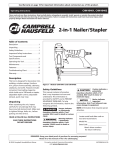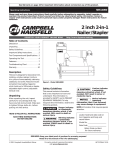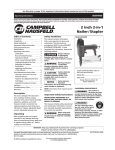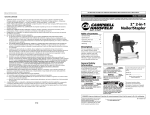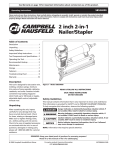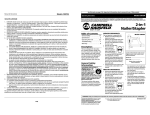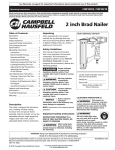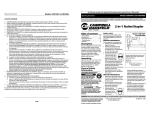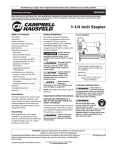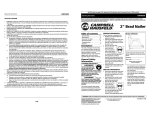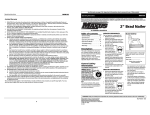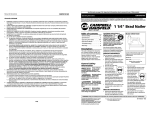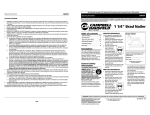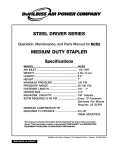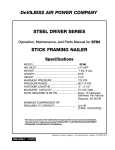Download Campbell Hausfeld NB0030 Operating instructions
Transcript
See Warranty on page 10 for important information about commercial use of this product. CHG00189 (Model CHN10401) Operating Instructions Please read and save these instructions. Read carefully before attempting to assemble, install, operate or maintain the product described. Protect yourself and others by observing all safety information. Failure to comply with instructions could result in personal injury and/or property damage! Retain instructions for future reference. 2-in-1 Nailer / Stapler Register your product online now! http://www.chpower.net/reg Table of Contents Description . . . . . . . . . . . . . . . . . . . . . . 1 Unpacking . . . . . . . . . . . . . . . . . . . . . . 1 Safety Guidelines . . . . . . . . . . . . . . . . . 1 Important Safety Instructions . . . . . . . 2 Tool Components and Specifications . . . . . . . . . . . . . . . . . . . . 2 Operating the Tool . . . . . . . . . . . . . . . 5 Maintenance . . . . . . . . . . . . . . . . . . . . 7 Fasteners . . . . . . . . . . . . . . . . . . . . . . . . 8 Troubleshooting Chart . . . . . . . . . . . . .9 Warranty . . . . . . . . . . . . . . . . . . . . . . . 10 Description This tool is designed for decorative trim, molding, window casings, furniture trim, picture frame assembly, cabinetry, casebacks, and crafts. Features include: convenient top loading magazine which holds up to 100 brads or staples, adjustable depth control, adjustable exhaust, quick clear nose. Unpacking After unpacking the unit, inspect carefully for any damage that may have occurred during transit. Make sure to tighten fittings, bolts, etc., before putting unit into service. Read & Follow All Instructions Save These Instructions Do Not Discard Figure 1 - Model CHN10401 Safety Guidelines This manual contains information that is very important to know and understand. This information is provided for SAFETY and to PREVENT EQUIPMENT PROBLEMS. To help recognize this information, observe the following symbols. Danger indicates an imminently hazardous situation which, if not avoided, WILL result in death or serious injury. Warning indicates a potentially hazardous situation which, if not avoided, COULD result in death or serious injury. Caution indicates a potentially hazardous situation which, if not avoided, MAY result in minor or moderate injury. Notice indicates important information, that if not followed, may cause damage to equipment. NOTE: Information that requires special attention. Locate model and date code on tool and record below: Model No. ______________________ Date Code ______________________ Retain these numbers for future reference. REMINDER: Keep your dated proof of purchase for warranty purposes! Attach it to this manual or file it for safekeeping. © 2012 Campbell Hausfeld/Scott Fetzer For parts, product & service information visit www.chpower.com IN738400AV 1/12 Operating Instructions Important Safety Instructions INSTRUCTIONS PERTAINING TO A RISK OF FIRE, ELECTRIC SHOCK, OR INJURY TO PERSONS This manual contains safety, operational and maintenance information. Contact your Campbell Hausfeld representative if you have any questions. When using tools, basic precautions should always be followed, including the following: California proposition 65 This product or its power cord may contain chemicals known to the State of California to cause cancer and birth defects or other reproductive harm. Wash hands after handling. You can create dust when you cut, sand, drill or grind materials such as wood, paint, metal, concrete, cement, or other masonry. This dust often contains chemicals known to cause cancer, birth defects, or other reproductive harm. Wear protective gear. General a. To reduce the risks of electric shock, fire, and injury to persons, read all the instructions before using the tool. b. Be thoroughly familiar with the controls and the proper use of the equipment. Follow all instructions. Contact your Campbell Hausfeld representative if you have any questions. c. Only persons well acquainted with these rules of safe operation should be allowed to use the unit. Read and understand tool labels and manual. Failure to follow warnings, dangers, and cautions could result in DEATH or SERIOUS INJURY. Work Area a. Keep the work area clean and well lighted. Cluttered benches and dark areas increase the risks of electric shock, fire, and injury to persons. b. Do not operate the tool in explosive atmospheres, such as in the presence of flammable liquids, gases, or dust. The tool is able to create sparks resulting in the ignition of the dust or fumes. c. Keep bystanders, children, and visitors away while operating the tool. Distractions are able to result in the loss of control of the tool. Tool Components and Specifications Personal Safety a. Stay alert. Watch what you are doing and use common sense when operating the tool. Do not use the tool while tired or under the influence of drugs, alcohol, or medication. A moment of inattention while operating the tool increases the risk of injury to persons. b. Dress properly. Do not wear loose clothing or jewelry. Contain long hair. Keep hair, clothing, and gloves away from moving parts. Loose clothes, jewelry, or long hair increases the risk of injury to persons as a result of being caught in moving parts. c. Avoid unintentional starting. Be sure the switch is off before connecting to the air supply. Do not carry the tool with your finger on the switch or connect the tool to the air supply with the switch on. d. Do not overreach. Keep proper footing and balance at all times. Proper footing and balance enables better control of the tool in unexpected situations. e. Use safety equipment. A dust mask, non-skid safety shoes and a hard hat must be used for the applicable conditions. Cap Exhaust • Requires: 0.3 SCFM with 10 fasteners per minute @ 90 psi Trigger • Air inlet: 1/4 inch NPT • FASTENER SIZE RANGE: 3/8 inch to 1-1/4 inch • MAGAZINE CAPACITY: 100 fasteners per load, 18 gauge Latch Button • STAPLES: 1/4 inch crown • WEIGHT: 2 lbs., 15 oz. • LENGTH: 10-1/2 inch • HEIGHT: 9-1/2 inch • MAXIMUM PRESSURE: 100 psi • PRESSURE RANGE: 60 psi to 100 psi Quick Clear Nose Fastener Discharge Area Work Contact Element (WCE) www.chpower.com 2 Magazine CHG00189 (Model CHN10401) Important Safety Instructions (Continued) d. Disconnect the tool from the air source before making adjustments, doing tool maintenance, clearing jams, leaving work area,loading, or unloading the tool. Such f. Always wear eye protection. g. Always wear hearing protection when using the tool. Prolonged exposure to high intensity noise is able to cause hearing loss. h. Do not attach the hose or tool to your body. Attach the hose to the structure to reduce the risk of loss of balance if the hose shifts. i. Always assume that the tool contains fasteners. Do not point the tool toward yourself or anyone whether it contains fasteners or not. j. Do not nail on top of another nail. This is able to cause the nail to be deflected and hit someone, or cause the tool to react and result in a risk of injury to persons. k. Remove finger from the trigger when not driving fasteners. Never carry the tool with finger on trigger, the tool is able to fire a fastener. Always remain in a firmly balanced position when using or handling the tool. Avoid long extended periods of work with the tool. Stop using the tool if you feel pain in hands or arms. Tool Use and Care a. Use clamps or another practical way to secure and support the workpiece to a stable platform. Holding the work by hand or against the body is unstable and is able to lead to loss of control. b. Do not force the tool. Use the correct tool for the application. The correct tool will do the job better and safer at the rate for which the tool is designed. c. Do not use the tool if the switch does not turn the tool on or off. Any tool that cannot be controlled with the switch is dangerous and must be repaired. precautionary measures reduce the risk of injury to persons. e. Store the tool when it is idle out of reach of children and other untrained persons. A tool is dangerous in the hands of untrained users. f. Maintain the tool with care. Keep a cutting tool sharp and clean. A properly maintained tool, with sharp cutting edges reduces the risk of binding and is easier to control. g. Check for misalignment or binding of moving parts, breakage of parts, and any other condition that affects the tool’s operation. If damaged, have the tool serviced before using. Many accidents are caused by poorly maintained tools. There is a risk of bursting if the tool is damaged. h. Use only those fasteners listed in the Accessories section of this manual. Fasteners not identified for use with this tool by the tool manufacturer are able to result in a risk of injury to persons or tool damage when used in this tool. i. Selecting an appropriate tool actuation system, taking into consideration the work application for which the tool is used. Never use gasoline or other flammable liquids to clean the tool. Never use the tool in the presence of flammable liquids or gases. Vapors could ignite by a spark and cause an explosion which will result in death or serious personal injury. Do not touch the trigger unless driving fasteners. Never attach air line to tool or carry tool while touching the trigger. The tool could eject a fastener which will result in death or serious personal injury. Also actuate the trigger lock to the safe position when not in use. Always disconnect the tool from the power source when unattended, performing any maintenance or repair, clearing a jam, or moving the tool to a new location. Do not load the tool with fasteners when the trigger is depressed. The tool could eject a fastener causing death or serious personal injury. Always fit tool with a fitting or hose coupling on or near the tool in such a manner that all compressed air in the tool is discharged at the time the fitting or hose coupling is disconnected. Do not use a check valve or any other fitting which allows air to remain in the tool. Death or serious personal injury could occur. Never place hands or any other body parts in the fastener discharge area of the tool. The tool might eject a fastener and could result in death or serious personal injury. Never carry the tool by the air hose or pull the hose to move the tool or a compressor. Keep hoses away from heat, oil and sharp edges. Replace any hose that is damaged, weak or worn. Personal injury or tool damage could occur. Do not remove, tamper with, or otherwise cause the trigger lock or trigger to become inoperable. Do not operate any tool which has been modified in a like fashion. Death or serious personal injury could result. www.chpower.com 3 Operating Instructions Important Safety Instructions (Continued) Always assume the tool contains fasteners. Respect the tool as a working implement; no horseplay. Always keep others at a safe distance from the work area in case of accidental discharge of fasteners. Do not point the tool toward yourself or anyone whether it contains fasteners or not. Accidental triggering of the tool could result in death or serious personal injury. Do not drive a fastener on top of other fasteners. The fastener could glance and cause death or a serious puncture wound. Service a. Tool service must be performed only by qualified repair personnel. b. When servicing a tool, use only identical replacement parts. Use only authorized parts. Do not drop or throw the tool. Dropping or throwing the tool can result in damage that will make the tool unusable or unsafe. If the tool has been dropped or thrown, examine the tool closely for bent, cracked or broken parts and air leaks. STOP and repair before using or serious injury could occur. Clean and check all air supply hoses and fittings before connecting the tool to an air supply. Replace any damaged or worn hoses or fittings. Tool performance or durability may be reduced. c. Use only the lubricants supplied with the tool or specified by the manufacturer. ! WARNING Do not operate or allow anyone else to operate the tool if any warnings or warning labels are not legible. Warnings or warning labels are located on the tool magazine and body. Avoid using the tool when the magazine is empty. Accelerated wear on the tool may occur. serious injury to persons. Use only clean, dry, regulated compressed air at the rated pressure or within the rated pressure range as marked on the tool. Always verify prior to using the tool that the air source has been adjusted to the rated air pressure or within the rated air-pressure range. Do not make any modifications to the tool without first obtaining written approval from Campbell Hausfeld. Do not use the tool if any shields or guards are removed or altered. Do not use the tool as a hammer. Personal injury or tool damage may occur. Disconnect air supply and release tension from the pusher before attempting to clear jams because fasteners can be ejected from the front of the tool. Personal injury may occur. Air Source a. Never connect to an air source that is capable of exceeding 200 psi. Over pressurizing the tool is able to result in bursting, abnormal operation, breakage of the tool or b. Never use oxygen, carbon dioxide, combustible gases or any bottled gas as an air source for the tool. Such gases are capable of explosion and serious injury to persons. Do not use any O CO type of reactive gases, including, but not limited to, oxygen and combustible gases, as a power source. Use filtered, lubricated, regulated compressed air only. Use of a reactive gas instead of compressed air may cause the tool to explode which will cause death or serious personal injury. 2 Use only a pressure-regulated compressed air source to limit 100 psi the air pressure supplied to the tool. The regulated pressure must not exceed 100 psi. If the regulator fails, the pressure delivered to the tool must not exceed 200 psi. The tool could explode which will cause death or serious personal injury. Save These Instructions Do Not Discard Recommended Hookup Regulator Quick Coupler Quick Plug (Optional) Oiler Quick Coupler (Optional) Air Hose Filter www.chpower.com 4 BUILT TO LAST CHG00189 (Model CHN10401) Operating the Tool Lubrication This tool requires lubrication before using the tool for the first time and before each use. If an inline oiler is used, manual lubrication through the air inlet is not required on a daily basis. The work surface can become damaged by excessive lubrication. Proper lubrication is the owner’s responsibil- ity. Failure to lubricate the tool properly will dramatically shorten the life of the tool and void the warranty. 1. Disconnect the air supply from the tool to add lubricant. 2. Turn the tool so the air inlet is facing up. Place 4-5 drops of 30 W non-detergent oil into air inlet. Do not use detergent oils, oil additives, or air tool oils. Air tool oils contain solvents which will damage the tool's internal components. 3. After adding oil, run tool briefly. Wipe off any excess oil from the cap exhaust. Recommended Hookup The illustration below shows the recommended hookup for the tool. 1. The air 60 psi compressor min. must be able 100 psi to maintain a max. minimum of 60 psi when the tool is being used. An inadequate air supply can cause a loss of power and inconsistent driving. 2. An oiler can be used to provide oil circulation through the tool. A filter can be used to remove liquid and solid impurities which can rust or “gum up” internal parts of the tool. 3. Use 1/4 inch 150 psi WP air hoses with a minimum 1/4 inch I.D. working pressure of 150 psi. Use 3/8 inch air hoses for 50 ft. run or longer. For better performance, install a 3/8 inch quick plug (1/4 inch NPT threads) with an inside diameter of .315 inch (8mm) on the tool and a 3/8 inch quick coupler on the air hose. 4. Use a pressure regulator on the compressor, with an operating pressure of 0 -125 psi. A pressure regulator is required to control the operating pressure of the tool between 60 and 100 psi. Single SEQUENTIAL Mode This mode requires the trigger to be pulled each time a fastener is driven. The tool can be actuated by depressing the WCE against the work surface followed by pulling the trigger. The trigger must be released to reset the tool before another fastener can be driven. Checking the Work Contact element (WCE) Check the operation of the Work Contact Element (WCE) trip mechanism before each use. The WCE must move freely without binding through its entire travel distance. The WCE spring must return the WCE to its fully extended position after being depressed. Do not operate the tool if the WCE trip mechanism is not operating properly. Personal injury may occur. 1. Disconnect the air supply from the tool. 3. Make sure the trigger and work contact element (WCE) move freely up and down without sticking or binding. Movement 4. Reconnect air supply to the tool. 5. Depress the Work Contact Element (WCE) against the work surface without pulling the trigger. The tool must not operate. Do not use the tool if it operates without pulling the trigger. Personal injury may result. 6. Remove the tool from the work surface. The Work Contact Element (WCE) must return to its original down position. The tool must not operate. Do not use the tool if it operates while lifted from the work surface. Personal injury may result. 7. Pull the trigger and depress the work contact element (WCE) against the work surface. The tool MUST NOT operate. 8. Depress the Work Contact Element (WCE) against the 1 2 work surface. Pull the trigger. The tool MUST operate. An improperly functioning tool must not be used. Do not actuate the tool unless the tool is placed firmly against the work piece. 2. Remove all fasteners from the magazine (see Loading/ Unloading). www.chpower.com 5 Operating Instructions Operating the Tool (Continued) LOADING/UNLOADING THE TOOL 1. Always disconnect the tool from the air supply before loading fasteners. Latch button 3a.For nails, insert a stick into the magazine. Make sure the pointed ends of the fasteners are resting on the bottom ledge of the magazine when loading. Make sure the nails are not dirty or damaged. 3b.For staples, load a clip of staples with the crowns straddling the magazine rail. 3. Undo latch by pulling out and down. The wire latch will disengage from the hooks on the nose. (C) 3. For deeper penetration, turn the wheel (C) to left to the extent desired. BUILT TO LAST 2. Push down on the latch button. Pull back on the magazine cover. 2. For shallow penetration, turn the wheel (C) to right to the extent desired. Magazine rail 4. Push the magazine cover forward until latch button pops up. 5. Always unload all fasteners before removing tool from service. Unloading is the reverse of loading, except that you must disconnect the air supply before unloading. ADJUSTING THE FASTENER PENETRATION The tool is equipped with an adjustable depth of drive feature. This allows the user to determine how deep a fastener will be driven into the work surface. 1. Adjust operating pressure so fasteners are driven consistently. Do not exceed 100 psi. 4. Make sure trigger and work contact element (WCE) move freely up and down without binding or sticking after each adjustment. Movement Adjusting The Direction Of The Exhaust The tool is equipped with an adjustable direction exhaust Rotate deflector. This is intended to allow the user to change the direction of the exhaust. Simply twist the deflector to any direction desired. CLEARING A JAM FROM THE TOOL 1. Disconnect the air supply from the nailer. 4. The door can now be rotated, exposing the jammed fastener. 5. Remove the jammed fastener, using pliers or a screwdriver if required. 6 Rotate door back into the closed position. 7. Extend the wire latch and place over the hooks on the nose. 8. Close the latch by pushing the latch up and in until the latch snaps into place. 9. Make sure the trigger and work contact element (WCE) move freely up and down without sticking or binding. 2. Remove all fasteners from the magazine (see “Loading/ Unloading The Nailer”). Failure to remove all fasteners will cause the fasteners to eject from the front of the tool. www.chpower.com 6 CHG00189 (Model CHN10401) Maintenance Tool Repair Storage Technical Service Only qualified personnel should repair the tool, and they should use genuine Campbell Hausfeld replacement parts and accessories, or parts and accessories which perform equivalently. The tool should be stored in a cool, dry place. Please call our Tool Hotline at 1-800543-6400 with any questions regarding the operation or repair of this tool or for additional copies of this manual. Fastener And Replacement Parts Use only genuine Campbell Hausfeld 18 gauge fasteners (or equivalent - see Fastener Interchange Information). Use only genuine Campbell Hausfeld replacement parts. Never substitute parts. Do not use modified parts or parts which will not give equivalent performance to the original equipment. Tool performance, safety and durability could be reduced. When ordering replacement parts or fasteners, specify by part number. Assembly Procedure For Seals When repairing a tool, the internal parts must be cleaned and lubricated. Parker O-lube or equivalent must be used on all o-rings. Each o-ring must be coated with O-lube before assembling. A small amount of oil must be used on all moving surfaces and pivots. After reassembling, a few drops of 30W non-detergent oil or equivalent, must be added through the air line before testing. Notes www.chpower.com 7 Operating Instructions Fasteners Fasteners Nails The following Campbell Hausfeld Brad nails are available at local retail stores. For help locating any item, call customer service at 1-800-543-6400. Campbell Hausfeld nails meet or exceed ASTM Standard F1667. Model Length Shank Gauge Finish Head Collation Nails Per Stick Nails Per Box FB002000 3/4 inch 18 Gauge Galvanized Brad / Brown Adhesive 100 5000 FB180016 5/8 inch 18 Gauge Galvanized Brad / Brown Adhesive 100 1000 FB180025 1 inch 18 Gauge Galvanized Brad / Brown Adhesive 100 1000 FB180030 1-1/4 inch 18 Gauge Galvanized Brad / Brown Adhesive 100 1000 Interchange Information Can use brad nails from the following branded air-powered brad nailers: Bostitch BT125SK-2 & BT200K-2, Campbell Hausfeld NB0030 & NB0040, DeWalt D51238K, Paslode T125-F18 & T200-F18, Porter Cable BN125 & BN200, and Senco Finish Pro 15 & 18. staples The following Campbell Hausfeld staples are available at local retail stores. If you need help locating any item, call customer service at 1-800-543-6400. Campbell Hausfeld staples meet or exceed astm Standard F1667. Model Length Wire Diameter Crown Size Point Finish Collation Staples Per Stick Staples Per Box FN180615 1/2 inch 18 Gauge 1/4 inch Chisel Galvanized / Vinyl Coated Adhesive 100 1000 FN180620 3/4 inch 18 Gauge 1/4 inch Chisel Galvanized / Vinyl Coated Adhesive 100 1000 FN180625 1 inch 18 Gauge 1/4 inch Chisel Galvanized / Vinyl Coated Adhesive 100 1000 FN180630 1-1/4 inch 18 Gauge 1/4 inch Chisel Galvanized / Vinyl Coated Adhesive 100 1000 Interchange Information Staples used in the SB514000 will also work in: Senco LN4450, SJS-LR, SKS L11-15, Hitachi N3804A, Duofast BN-1832S, KN-1848, StanTech SDS 18-14, Atro Minor 90/30, 90/32, 90/40, and Porter Cable NS100. www.chpower.com 8 CHG00189 (Model CHN10401) Troubleshooting Chart Stop using tool immediately if any of the following problems occur. Serious personal injury could occur. Any repairs or replacements must be done by a Qualified Service Person or Authorized Service Center. Symptom Possible Cause(s) Corrective Action Air leaking at trigger valve area O-rings in trigger valve housing are damaged Replace o-rings. Check operation of Work Contact Element (WCE) Air leaking between housing and nose 1. Loose screws in housing 1. Tighten screws Air leaking between housing and cap Tool skips driving fastener Tool runs slow or has loss of power Fasteners are jammed in tool 2. Damaged o-rings 2. Replace o-rings 3. Damage to bumper 3. Replace bumper 1. Loose screws 1. Tighten screws 2. Damaged gasket 2. Replace gasket 1. Worn bumper 1. Replace bumper 2. Dirt in nose piece 2. Clean drive channel 3. Dirt or damage prevent fasteners or pusher from moving freely in magazine 3. Clean magazine 4. Damaged pusher spring 4. Replace spring 5. Inadequate air flow to tool 5. Check fitting, hose, or compressor 6. Worn o-ring on piston or lack of lubrication 6. Replace and lubricate o-rings 7. Damaged o-ring on trigger valve 7. Replace o-rings 8. Air leaks 8. Tighten screws and fittings 9. Cap gasket leaking 9. Replace gasket 1. Tool not lubricated sufficiently 1. Lubricate tool 2. Broken spring in cylinder cap 2. Replace spring 3. Exhaust port in cap is blocked 3. Replace damaged internal parts 1. Guide on driver is worn 1. Replace guide 2. Fasteners are not correct size 2. Use only recommended fasteners 3. Fasteners are bent 3. Replace with undamaged fasteners 4. Magazine or nose screws are loose 4. Tighten screws 5. Driver is damaged 5. Replace driver www.chpower.com 9 Operating Instructions Limited Warranty 1. DURATION: From the date of purchase by the original purchaser as follows: One (1) Year. 2. WHO GIVES THIS WARRANTY (WARRANTOR): Campbell Hausfeld / Scott Fetzer Company, 100 Production Drive, Harrison, Ohio, 45030, Telephone: (800) 543-6400. 3. WHO RECEIVES THIS WARRANTY (PURCHASER): The original purchaser (other than for purposes of resale) of the Campbell Hausfeld product. 4. WHAT PRODUCTS ARE COVERED BY THIS WARRANTY: This Campbell Hausfeld air tool. 5. WHAT IS COVERED UNDER THIS WARRANTY: Substantial defects in material and workmanship which occur within the duration of the warranty period with the exceptions below. 6. WHAT IS NOT COVERED UNDER THIS WARRANTY: A. Implied warranties, including those of merchantability and FITNESS FOR A PARTICULAR PURPOSE ARE LIMITED FROM THE DATE OF ORIGINAL PURCHASE AS STATED IN THE DURATION. If this product is used for commercial, industrial or rental purposes, the warranty will apply for ninety (90) days from the date of purchase. Some States do not allow limitation on how long an implied warranty lasts, so the above limitations may not apply to you. B. ANY INCIDENTAL, INDIRECT, OR CONSEQUENTIAL LOSS, DAMAGE, OR EXPENSE THAT MAY RESULT FROM ANY DEFECT, FAILURE, OR MALFUNCTION OF THE CAMPBELL HAUSFELD PRODUCT. Some States do not allow the exclusion or limitation of incidental or consequential damages, so the above limitation or exclusion may not apply to you. C. Any failure that results from an accident, purchaser’s abuse, neglect or failure to operate products in accordance with instructions provided in the owner’s manual(s) supplied with product. Accident, purchaser's abuse, neglect or failure to operate products in accordance with instructions shall also include the removal or alteration of any safety devices. If such safety devices are removed or altered, this warranty is void. D. Normal adjustments which are explained in the owner’s manual(s) provided with the product. E. Items or service that are normally required to maintain the product. 7. RESPONSIBILITIES OF WARRANTOR UNDER THIS WARRANTY: Repair or replace, at Warrantor’s option, products or components which are defective, have malfunctioned and/or failed to conform within the duration of the specific warranty period. 8. RESPONSIBILITIES OF PURCHASER UNDER THIS WARRANTY: A. Provide dated proof of purchase and maintenance records. B. Call Campbell Hausfeld (800) 543-6400 to obtain your warranty service options. Freight costs must be borne by the purchaser. C. Use reasonable care in the operation and maintenance of the products as described in the owner’s manual(s). 9. WHEN WARRANTOR WILL PERFORM REPAIR OR REPLACEMENT UNDER THIS WARRANTY: Repair or replacement will be scheduled and serviced according to the normal work flow at the servicing location, and depending on the availability of replacement parts. This Limited Warranty applies in the United States, Canada and Mexico only and gives you specific legal rights. You may also have other rights which vary from state to state or country to country. www.chpower.com 10 Ver la Garantía en página 10-Sp para información importante sobre el uso comercial de este producto. CHG00189 (Modelo CHN10401) Manual de Instrucciones de Operación Por favor lea y guarde estas instrucciones. Léalas cuidadosamente antes de tratar de montar, instalar, operar o dar mantenimiento al producto aquí descrito. Protéjase usted mismo y a los demás observando toda la información de seguridad. ¡El no cumplir con las instrucciones puede ocasionar daños, tanto personales como a la propiedad! Guarde estas instrucciones para referencia en el futuro. Clavadora / Agrapadora 2-en-1 ¡Registre su producto en línea ahora mismo! http://www.chpower.net/reg Índice Descripción . . . . . . . . . . . . . . . . . . . . 1-Sp Desempaque . . . . . . . . . . . . . . . . . . 1-Sp Medidas de Seguridad . . . . . . . . . . . 1-Sp Instrucciones de Seguridad Importantes . . . . . . . . . . . . . . . . . . . 2-Sp Componentes y Specificaciones de la Herramienta . . . . . . . . . . . . . . 2-Sp Cómo usar la Herramienta . . . . . . . 5-Sp Mantenimiento . . . . . . . . . . . . . . . . 7-Sp Sujetadores . . . . . . . . . . . . . . . . . . . . 8-Sp Guía de Diagnóstico de Averías . . . 9-Sp Garantía Limitada . . . . . . . . . . . . . 10-Sp Descripción Esta herramienta está diseñada para contramarcos y molduras decorativas, contramarcos de ventanas, chambranas, ensamblaje de marcos de cuadros, marquetería, fondo de cajas, y manualidades. Las características incluyen: conveniente cargador con entrada superior con una capacidad de hasta 100 sujetadores, control de profundidad ajustable, orificio de salida ajustable, boquilla de desobstrucción rápida. Desempaque Al desempacar este producto, revíselo con cuidado para cerciorarse de que esté en perfecto estado. Cericiórese de apretar todas las conexiones, pernos, etc. antes de comenzar a utilizar la unidad. LEA Y SIGA TODAS LAS INSTRUCCIONES Figura 1 - Modelo CHN10401 Medidas de Seguridad Este manual contiene información que es muy importante que sepa y comprenda. Esta información se la suministramos como medida de SEGURIDAD y para EVITAR PROBLEMAS CON EL EQUIPO. Debe reconocer los siguientes símbolos. Ésto le indica que hay una situación inmediata que LE OCASIONARIA la muerte o heridas de gravedad. Ésto le indica que hay una situación que PODRIA ocasionarle la muerte o heridas de gravedad. Ésto le indica que hay una situación que PODRIA ocasionarle heridas no muy graves. Ésto le indica una información importante, que de no seguirla, le podría ocasionar daños al equipo. NOTA: Información que requiere atención especial. Localice el modelo y el código de fecha y regístrelo debajo: Modelo Nº ______________________ Código de fecha ________________ GUARDE ESTAS INSTRUCCIONES – NO LAS DESECHE Conserve estos números para referencia. RECORDATORIO: ¡Guarde su comprobante de compra con fecha para fines de la garantía! Adjúntela a este manual o archívela en lugar seguro. © 2012 Campbell Hausfeld/Scott Fetzer 1-Sp IN738400AV 1/12 Manual de Instrucciones de Operación Instrucciones de Seguridad Importantes General PROPOSICIÓN 65 DE CALIFORNIA a. Para reducir el riesgo de choque eléctrico, incendio y lesiones personales, lea todas las instrucciones antes de usar la herramienta. b. Familiarísece con los controles y el uso adecuado del equipo. Siga todas las instrucciones. Póngase en contacto con su representante Campbell Hausfeld si tiene alguna pregunta. c. Sólo se les debe permitir usar esta unidad a aquellas personas bien familiarizadas con estas reglas de manejo seguro. Área de trabajo INSTRUCCIONES EN REFERENCIA AL PELIGRO DE INCENDIOS, CHOQUE ELÉCTRICO O LESIONES PERSONALES Este manual contiene información sobre seguridad, funcionamiento y mantenimiento. Póngase en contacto con su representante Campbell Hausfeld si tiene alguna pregunta. Cuando se usen herramientas, siempre se deberán seguir precauciones básicas, incluyendo las siguientes: Este producto, o su cordón eléctrico, puede contener productos químicos conocidos por el estado de California como causantes de cáncer y defectos de nacimiento u otros daños reproductivos. Lave sus manos después de usar. Cuando corta lija, taladra o pule materiales como por ejemplo madera, pintura, metal, hormigón, cemento, u otro tipo de mampostería se puede producir polvo. Con frecuencia este polvo contiene productos químicos que se conocen como causantes de cáncer, defectos congénitos u otros daños reproductivos. Use equipo de protección. Lea y comprenda las etiquetas y el manual de la herramienta. Si no respeta las advertencias, los riesgos y las recomendaciones, eso podría resultar en la MUERTE o en LESIONES GRAVES. a. Mantenga el área de trabajo limpia y bien iluminada. Los bancos desordenados y las áreas oscuras aumentan el riesgo de choque eléctrico, incendio y lesiones personales. b. No haga funcionar la herramienta en entornos explosivos, como por ejemplo cuando haya polvo, líquidos o gases inflamables. La herramienta puede crear chispas y provocar la ignición de polvo o vapores. Componentes y Specificaciones de la Herramienta • Requiere: 0,01 m /min con 10 sujetadores por minuto a 6,21 bar c. Mantenga alejados a los observadores, niños y visitantes mientras hace funcionar la herramienta. Las distracciones pueden dar como resultado la pérdida del control de la herramienta. SEGURIDAD PERSONAL a. Manténgase alerta. Mire lo que está haciendo y use el sentido común cuando haga funcionar la herramienta. No use la herramienta si está cansado o bajo la influencia de drogas, alcohol o medicamentos. Un momento de desatención mientras hace funcionar la herramienta aumenta el riesgo de lesiones personales. b. Vístase adecuadamente. No use alhajas ni vestimenta suelta. Sujétese el cabello largo. Mantenga el cabello, vestimenta y guantes alejados de las piezas móviles. La vestimenta suelta, las alhajas o el cabello largo aumentan el riesgo de lesiones personales como resultado de quedar atrapados en las piezas móviles. c. Evite que se encienda accidentalmente. Asegúrese de que el interruptor esté en la posición de apagado antes de conectar el suministro de aire. No lleve la herramienta con su dedo sobre el interruptor ni conecte la herramienta al suministro de aire con el interruptor en la posición de encendido. Orifico de salida de aire 3 Gatillo • ENTRADA DE AirE: 6,4 mm (1/4 pulg.) NPT • RANGO DE LOS SUJETADORES: 9,5 mm a 3,18 cm (3/8 pulg. a 1-1/4 pulg.) Botón del seguro • CAPACIDAD DEL CARGADOR: 100 sujetadores por carga, calibre 18 • GRAPAS: corona de 6,4 mm (1/4 pulg.) • PESO: 1,33 kg • LONGITUD: 26,67 cm (10-1/2 pulg.) • ALTURA: 24,13 cm (9-1/2 pulg.) Boquilla de desobstrucción rápida • PRESION MáXIMA: 6,90 bar • RANGO DE LA Presión: 4,14 bar a 6,90 bar Elemento de contacto de trabajo (WCE) área de descarga de los sujetadores 2-Sp Cargador CHG00189 (Modelo CHN10401) Instrucciones de Seguridad Importantes (Continuación) d. No intente alcanzar lugares alejados. Mantenga un buen soporte y equilibrio en todo momento. Un soporte y equilibrio adecuados permiten un mejor control de la herramienta en situaciones inesperadas. e. Use equipo de seguridad. Se debe usar una mascara para polvo, calzado de seguridad antideslizante y casco para las condiciones que se apliquen. f. Siempre use protección para los ojos. g. Use siempre una protección para el oído cuando use la herramienta. La exposición prolongada a ruido de alta intensidad puede causar pérdida de audición. h. No ate la manguera ni la herramienta a su cuerpo. Adjunte la manguera a la estructura para reducir el riesgo de pérdida de equilibrio si la manguera se cambia de posición. i. Siempre asuma que la herramienta contiene clavos. No apunte con la herramienta hacia usted o hacia otra persona, ya sea que contenga clavos o no. No clave ningún clavo encima de otro clavo. Esto puede hacer que el clavo se desvíe y golpee a alguien, o provocar que la herramienta reaccione y cause el riesgo de lesiones personales. j. k. Quite el dedo del gatillo cuando no esté clavando clavos. Nunca lleve la herramienta con su dedo en el gatillo: la herramienta puede disparar un clavo. Siempre colóquese en una posición firme y balanceada para usar o manipular la herramienta. Evite trabajar con esta herramienta por largos periodos. Deje de usar la herramienta si siente dolor en las manos o en los brazos. Uso y cuidado de la herramienta a. Use sujetadores u otra manera práctica de asegurar y apoyar la pieza de trabajo a una plataforma estable. Sostener el trabajo con la mano o contra el cuerpo es algo inestable y puede producir la pérdida de control. b. No fuerce la herramienta. Use la herramienta correcta para la aplicación. La herramienta correcta hará el trabajo mejor y en forma más segura a la velocidad para la cual fue diseñada. c. No use la herramienta si el interruptor no la enciende o no la apaga. Cualquier herramienta que no pueda ser controlada con el interruptor es peligrosa y debe repararse. d. Desconecte la herramienta del suministro de aire antes de hacer cualquier ajuste, realizar el mantenimiento de la herramienta, eliminar obstrucciones, dejar el área de trabajo, cargar o descargar la herramienta. Estas medidas de precaución reducen el riesgo de lesiones personales. e. Cuando no esté en uso, guarde la herramienta fuera del alcance de los niños y otras personas no capacitadas. Una herramienta es peligrosa cuando está en manos de usuarios inexpertos. f. Cuide su herramienta. Mantenga una herramienta para cortar afilada y limpia. Una herramienta mantenida adecuadamente con bordes de corte afilados reduce el riesgo de atascarse y es más fácil de controlar. g. Verifique que las piezas móviles no estén desaliñadas ni adheridas, que no haya piezas rotas y que no exista ningún otro problema que afecten el funcionamiento de la herramienta. Si está dañada, haga que le realicen un servicio a la herramienta antes de usarla. Muchos accidentes son causados por herramientas que no tienen un mantenimiento adecuado. Si la herramienta sufre un daño, hay riesgo de explosión. h. Use únicamente los clavos detallados en la sección Accesorios de este manual. Los sujetadores no identificados por el fabricante de la herramienta para uso con esta herramienta pueden provocar riesgos de lesiones personales o daño a la herramienta al usarse con esta herramienta. 3-Sp i. Seleccionar un sistema de activación de la herramienta adecuado, tomando en cuenta la aplicación de trabajo para la cual se usa la herramienta. Nunca limpie la herramienta con gasolina o ningún otro líquido inflamable. Nunca use la herramienta en la cercanías de líquidos o gases inflamables. Una chispa podría encender los vapores y ocasionar una explosión que podría ocasionarle la muerte o heridas graves. No quite, modifique ni cause de otro modo que la traba del gatillo deje de funcionar. No haga funcionar ninguna herramienta que haya sido modificada de manera similar. Eso puede resultar en muerte o graves lesiones personales. No toque el gatillo a menos que se estén clavando sujetadores. Nunca conecte la línea de aire a la herramienta ni mueva la herramienta cuando esté tocando el gatillo. La herramienta podría expulsar un sujetador y producir la muerte o lesiones personales graves. También coloque el protector del gatillo en la posición de seguro cuando no esté en uso. Desconecte siempre la herramienta de la fuente de energía cuando no la esté atendiendo, cuando le esté realizando mantenimiento o reparaciones, desobstruyéndola o moviéndola a un nuevo sitio. No cargue la herramienta con sujetadores cuando el gatillo esté oprimido. La herramienta puede expulsar un sujetador y producir la muerte o lesiones personales graves. Siempre ajuste la herramienta con un conector o acoplador de mangueras colocado en o cerca de la herramienta de un modo tal que se descargue todo el aire comprimido en la herramienta en el momento en que se desconecte el conector o acoplador. No use una válvula de chequeo o ninguna conexión que permita que el aire permanezca en la herramienta. Se puede producir la muerte o lesiones personales graves. Manual de Instrucciones de Operación Instrucciones de Seguridad Importantes (Continuación) Nunca ponga las manos ni ninguna otra parte del cuerpo en el área de descarga de la herramienta. Ésta puede expulsar un sujetador y producir la muerte o lesiones personales graves. No deje que la herramienta se caiga ni la tire. Ésto podría dañarla o convertirla en algo peligroso de usar. En caso de que la herramienta se haya caído o la hayan tirado, revísela con cuidado a ver si está doblada o rota, si tiene alguna pieza dañada o tiene fugas de aire. DEJE de trabajar y repárela antes de usarla o podría ocasionarle heridas graves. Nunca cargue la herramienta por la manguera de aire ni hale la manguera para mover la herramienta o el compresor de aire. Mantenga las mangueras alejadas del calor, aceite y objetos puntiagudos. Reemplace cualquier manguera que esté dañada, débil o desgastada. Ésto podría ocasionar heridas o daños a la herramienta Siempre asuma que la herramienta tiene sujetadores. Respete la herramienta como un implemento de trabajo; no jugue con ella. Siempre mantenga a los demás a una distancia segura del área de trabajo, en caso de una descarga accidental de sujetadores. No apunte con la herramienta hacia usted o hacia otra persona, ya sea que contenga o no sujetadores. El disparo accidental de la herramienta podría resultar en la muerte o en graves lesiones personales. No clave un sujetador encima de otro. El sujetador podría saltar y ocasionarle la muerte o heridas graves. ! ADVERTENCIA No opere la herramienta ni permita que otros la operen si las etiquetas de advertencia están ilegibles. Éstas se encuentran en el cargador o el cuerpo de la herramienta. Evite usar la herramienta cuando el depósito está vacío. Ésto podría acelerar su desgaste. Limpie y chequee todas las mangueras de suministro de aire y conexiones antes de conectar la herramienta al compresor. Reemplace las mangueras y conexiones que estén dañadas o desgastadas. El rendimiento de la herramienta o su durabilidad podrían reducirse. Servicio a. El servicio de la herramienta debe ser realizado sólo por personal de reparaciones calificado. b. Al realizarle un servicio a la herramienta, utilice únicamente piezas de repuesto idénticas. Use sólo piezas autorizadas. c. Use sólo los lubricantes que el fabricante proporciona con la herramienta. No haga ninguna modificación a la herramienta sin obtener primero la aprobación por escrito de Campbell Hausfeld. No use la herramienta si le faltan alguna de las tapas protec-toras o si éstas han sido modifi-cadas. No use la herramienta como un martillo. Se pueden producir lesiones personales o daños a la herramienta. Desconecte la fuente de suministro de aire y elimine la tensión del disparador antes de tratar de sacar cualquier sujetador atascado, ya que la herramienta podría disparar un sujetador por el frente. Ésto podría ocasionarle heridas. Conexión Recomendada Acoplador rápido Conector rápido (Opcional) Suministro de aire a. Nunca conecte a un suministro de aire capaz de exceder las 13,79 bar. Someter la herramienta a presión excesiva puede resultar en una explosión, funcionamiento anormal, daños a la herramienta o graves lesiones personales. Use sólo aire comprimido limpio, seco y regulado a la presión de funcionamiento o dentro del rango de presiones indicado en la herramienta. Antes de usar la herramienta, verifique siempre que el suministro de aire haya sido regulado a la presión de funcionamiento o esté dentro del rango de presiones indicadas. b. No use nunca oxígeno, dióxido de carbono, gases combustibles o ningún gas en botellas como suministro de aire para la herramienta. Tales gases puede explotar y causar graves lesiones personales. No use ningún O CO tipo de gas reactivo, incluyendo, pero no limitado a, oxígeno y gases combustibles, como fuente de energía. Use sólo aire comprimido filtrado, lubricado y regulado. El uso de un gas reactivo en vez de aire comprimido puede provocar que la herramienta explote, lo cual puede ocasionar la muerte o graves lesiones personales. 2 Use solamente una fuente de aire comprimido de presión 6,90 bar regulada para limitar la presión de aire suministrada a la herramienta. La presión regulada no debe exceder los 6,90 bar. Si el regulador falla, la presión transmitida a la herramienta no debe exceder los 13,79 bar. La herramienta puede explotar, lo cual puede ocasionar la muerte o graves lesiones personales. GUARDE ESTAS INSTRUCCIONES – NO LAS DESECHE Regulador Lubricador Acoplador rápido (Opcional) Manguera de aire 4-Sp Filtro CHG00189 (Modelo CHN10401) Lubricacion Esta herramienta requiere lubricación antes de usarse por primera vez y antes de cada uso. Si utiliza un lubricador incorporado a la línea, no tendrá que lubricarla manualmente a diario. La superficie de trabajo se podría dañar debido a la lubricación excesiva. La lubricación adecuada es la responsabilidad del propietario. Si no lubrica la herramienta adecuadamente, ésta se dañará rápidamente y la garantía se cancelaría 1. Desconecte la herramienta de la fuente de suministro de aire para lubricarla. 2. Gire la herramienta de modo que la entrada de aire quede mirando hacia arriba. Agregue de 4 a 5 gotas de aceite no detergente 30W en la entrada de aire. No use aceites detergentes, aditivos de aceite, ni aceites para herramientas neumáticas. Los aceites para herramientas neumáticas contienen solventes que pueden averiar los componentes internos de la herramienta. 3. Después de agregar aceite, haga funcionar la herramienta brevemente. Limpie todo exceso de aceite que salga del orificio de salida de aire. conexiÓn Recomendada La ilustración de abajo le muestra la conexión recomendada para la herramienta. 1. El compresor de 4,14 bar aire debe tener Min. la capacidad 6,9 bar de suministrar Max. un mínimo de 4,14 bar cuando la herramienta esté en uso. Si el suministro de aire es inadecuado podría haber pérdida de potencia y falta de consistencia en el funcionamiento. 2. Puede utilizar un lubricador para lubricar la herramienta. Igualmente, puede utilizar un filtro para remover las impurezas líquidas y sólidas que podrían oxidar u obstruir las partes internas de la herramienta. 3. Use mangueras 1034 kPa PS de aire de 6,4 mm (1/4 pulg.) diseñadas 6,4 mm para presiones (1/4") D.I. mínimas de trabajo de 10,34 bar. Use mangueras de aire de 9,5 mm (3/8 pulg.) si la longitud de las mismas es de 15m ó más. Para un mejor rendimiento, instálele a la herramienta un conector rápido de 9,5 mm (3/8 pulg.) [roscas de 6,4 mm (1/4 pulg.) NPT] cuyo diámetro interno sea de 8 mm (0,315 pulg.) y un acoplador rápido de 9,5 mm (3/8 pulg.) a la manguera de aire. 4. Use un regulador de presión (de 0 bar-8,62 bar) en el compresor. Se necesita un regulador de presión para controlar la presión de operación de la herramienta entre 4,14 bar y 6,90 bar. MODO DE SECUENCIA SINGULAR Este sistema requiere que oprima el gatillo cada vez que vaya a clavar un sujetador. Para clavar el elemento de contacto debe tocar la superficie de trabajo y el operador debe oprimir el gatillo. Debe soltar el gatillo antes de clavar otro sujetador. como chequear el elemento de contacto Cheque el funcionamiento del mecanismo del elemento de contacto antes de cada uso. El elemento de contacto se debe desplazar libremente, sin pegarse, a lo largo del área de desplazamiento. El resorte del elemento de contacto debe regresar el elemento de contacto a su posición original totalmente extendido. No use la herramienta si el mecanismo del elemento de contacto no está funcionando adecudamente. Podría ocasionarle heridas. 5-Sp 1. Desconecte la herramienta de la fuente de suministro de aire. 2. Saque todos los sujetadores del cargador (Vea la Sección CargaDescarga). 3. Cerciórese de que el gatillo y el elemento de contacto se muevan libremente en ambos sentidos sin atascarse o pegarse. 4. Reconecte la herramienta a la fuente de suministro de aire. BUILT TO LAST Cómo usar la Herramienta (Continuación) Cómo usar la Herramienta Movemiento 5. Presione el Elemento de Contacto de Trabajo contra la superficie de trabajo sin apretar el gatillo. La herramienta NO DEBE OPERAR. No use la herramienta si opera sin apretar el gatillo. Se pueden producir lesiones personales. 6. Remueva la herramienta de la superficie de trabajo. El Elemento de Contacto de Trabajo tiene que volver a su posición original. La herramienta NO DEBE OPERAR. No use la herramienta si opera mientras está levantada de la superficie de trabajo. 7. Apriete el gatillo y presione el Elemento de Contacto de Trabajo contra la superficie de trabajo. La herramienta NO DEBE hacerse funcionar. Manual de Instrucciones de Operación 8. Presione el Elemento de Contacto de Trabajo contra 1 2 la superficie de trabajo. Apriete el gatillo. La herramienta DEBE OPERAR. Una herramienta que funciona de manera inadecuada no debe usarse. No active la herramienta a menos que esté colocada firmemente contra la pieza de trabajo. para cargar y descargar la herramienta 1. Siempre desconecte la herramienta del suministro de aire antes de cargar los sujetadores. 2. Empuje hacia Botón abajo sobre del el boton del seguro seguro. Mueva la tapa del cargador hacia atrás. 3a.Para puntillas, inserte una tira de puntillas en el cargador. Cerciórese de que los extremos puntiagudos de los clavos estén hacia la parte inferior del cargador. Cerciórese de que los clavos no estén sucios ni dañados. 3b.Para grapas, cargue una tira de grapas con las coronas montadas Carril del sobre el riel del cargador cargador. 4. Empuje la tapa del cargador hacia delante hasta que el botón del seguro salte hacia arriba. 5. Siempre descargue el sujetador antes de remover la herramienta de servicio. La descarga es lo opuesto a la carga, excepto que debe desconectar el suministro de aire antes de realizar la descarga. para ajustar la penetracion de los SUJETADORES La herramienta viene equipada con un mecanismo clavador de profundidad ajustable. Esto le permite al usuario determinar a qué profundidad se va a clavar en la superficie de trabajo. 1. Ajuste la presión de operación a aquella que usará con regularidad para clavar los sujetadores. No exceda la presión de 6,90 bar. 2. Para dirigir la herramienta, gire la rueda (C) (C) hacia la derecha hasta el punto deseado. 3. Para clavar el sujetador más profundo, gire la rueda (C) hacia la izquierda hasta el punto deseado. 4. Asegúrese que el gatillo y el Elemento de Contacto de Trabajo se mueven Movemiento libremente hacia arriba y hacia abajo sin atascarse o pegarse después de cada ajuste. BUILT TO LAST Cómo usar la Herramienta (Continuación) para ajustar la direccion del tubo de escape La herramienta está equipado con un deflector ajustable de la dirección del tubo Gire de escape. Éste le permite al usuario cambiar la dirección del tubo de escape. Simplemente mueva el deflector hacia la dirección deseada. quÉ hacer cuando la herramienta tenga un sujetador atascado 1. Desconecte la clavadora de la fuente de suministro de aire. 2. Remuezva todos los clavos del depósito (vea “Carga/ Descarga de la Clavadora”). 6-Sp Si no se retiran todos los sujetadores éstos saldrán por el frente de la herramienta. 3. Destrabe el seguro halando hacia afuera y abajo. El seguro de alambre se destraba de los ganchos de la boquilla. 4. Ahora se puede girar la puerta, dejando al descubierto el sujetador que esté trabado. 5. Retire todos los sujetadores que estén trabados, utilizando unas pinzas o un destornillador si fuera necesario. 6 Vuelva a girar la puerta a su posición de cerrado. 7. Extienda el seguro de alambre y colóquelo sobre los ganchos de la boquilla. 8. Cierre el seguro empujándolo hacia arriba y adentro hasta que quede a presión en su lugar. 9. Asegúrese de que el gatillo y el elemento de contacto de trabajo (WCE) se muevan libremente hacia arriba y hacia abajo sin adherirse ni trabarse. CHG00189 (Modelo CHN10401) Mantenimiento Assistência Técnica Para mayor información en relación al funcionamiento o reparación de este producto, comuníquese con el concesionario de Campbell Hausfeld más cercano a su domicilio. Sujetadores y Piezas de Repuesto Use solamente sujetadores Campbell Hausfeld originales calibre 18 (o su equivalente) - (vea la información sobre intercambio de sujetadores). Use solamente partes de repuesto Campbell Hausfeld originales. Nunca substituya las partes. No use partes modificadas o partes que no den un rendimiento equivalente al equipo original. El rendimiento de las herramientas, la seguridad y la duración pueden verse reducidos. Cuando ordene partes de repuesto o sujetadores, especifique el número de la parte. Para reparar la herramienta La herramienta debe ser reparada únicamente por personal calificado, y deben usar piezas de repuesto y accesorios originales Campbell Hausfeld, o piezas y accesorios que funcionen de manera equivalente. Para colocarle los sellos Cada vez que repare una herramienta deberá limpiarle y lubricarle las partes internas. Le recomendamos que use Parker O-lube o un lubricante equivalente en todos los anillos en O. A cada anillo en O se le debe dar un baño de lubricante para anillos antes de instalarlos. Igualmente, deberá ponerle un poco de aceite a todas las piezas que se mueven y muñones. Finalmente, después de haberla ensamblado y antes de probar la herramienta deberá ponerle unas cuantas gotas de aceite sin detergente 30W u otro aceite similar, en las líneas de aire. Notas 7-Sp Almacenamiento La clavadora debe guardarse en un lugar fresco y seco. Manual de Instrucciones de Operación Sujetadores Clavos Estos clavos para acabado de Campbell Hausfeld los puede comprar en su tienda más cercana. Si necesita ayuda para encontrar un artículo, comuníquese al 1-800-543-6400. Los clavos de Campbell Hausfeld cumplen o exceden el estándar ASTM F1667. Modelo Longitud Calibre del Cuerpo Acabodo Cabeza Unión Clavos por Linea Clavos por Caja FB002000 19,1 mm (3/4 inch) 18 Galvanisé Étêtée / Brun Adhésive 100 5000 FB180016 15,9 mm (5/8 inch) 18 Galvanisé Étêtée / Brun Adhésive 100 1000 FB180025 2,54 cm (1 inch) 18 Galvanisé Étêtée / Brun Adhésive 100 1000 FB180030 3,18 cm (1-1/4 inch) 18 Galvanisé Étêtée / Brun Adhésive 100 1000 Information D’Interchangeabilité Los clavos usados con la SB514000 también se pueden usar con las clavadoras: Bostitch BT125SK-2 & BT200K-2, Campbell Hausfeld NB0030 & NB0040, DeWalt D51238K, Paslode T125-F18 & T200-F18, Porter Cable BN125 & BN200, and Senco Finish Pro 15 & 18. grapas Estas grapas para acabado de Campbell Hausfeld los puede comprar en su tienda más cercana. Si necesita ayuda para encontrar un artículo, comuníquese al 1-800-543-6400. Las grapas de Campbell Hausfeld cumplen o exceden las especificaciones Federales FF-N-105B. Corona Punta Acabodo Unión Grapes por Linea Grapes por Caja 18 6,4 mm (1/4 inch) Burin Galvanisé / Enduit de Vinyle Adhésive 100 1000 19,1 mm (3/4 inch) 18 6,4 mm (1/4 inch) Burin Galvanisé / Enduit de Vinyle Adhésive 100 1000 FN180625 2,54 cm (1 inch) 18 6,4 mm (1/4 inch) Burin Galvanisé / Enduit de Vinyle Adhésive 100 1000 FN180630 3,18 cm (1-1/4 inch) 18 6,4 mm (1/4 inch) Burin Galvanisé / Enduit de Vinyle Adhésive 100 1000 Modelo Longitud FN180615 12,7 mm (1/2 inch) FN180620 Calibre de la Grapa Information D’Interchangeabilité Las grapas usadas con la SB514000 también se pueden usar con las grapadoras: Senco LN4450, SJS-LR, SKS L11-15, Hitachi N3804A, Duofast BN-1832S, KN-1848, ST-18, Stan-Tech SDS 18-14, Atro Minor 90/30, 90/32, 90/40, y Porter Cable NS100. 8-Sp CHG00189 (Modelo CHN10401) Guía de Diagnóstico de Averías Deje de usar la grapadora inmediatamente si alguno de los si guientes problemas ocurre. Podría ocasionarle heridas graves. Cualquier reparación o reemplazo de piezas los debe hacer un técnico calificado personal de un centro autorizado de servicio. Problema Causa Solución Hay una fuga de aire en el área de la válvula del gatillo Los anillos en O de la cubierta de la válvula del gatillo están dañados Debe reemplazar los anillos en O Hay una fuga de aire entre la cubierta y la boquilla 1. Los tornillos de la cubierta están flojos 1. Debe apretar los tornillos 2. Los anillos en O están dañados 2. Debe reemplazar los anillos en O 3. La defensa está dañada 3. Debe reemplazar la defensa Hay una fuga de aire entre la cubierta y la tapa 1. Los tornillos están flojos 1. Debe apretar los tornillos 2. El empaque está dañado 2. Debe reemplazar el empaque La herramienta deja de clavar un sujetador 1. La defensa está desgastada. 1. Debe reemplazar la defensa 2. La boquilla está sucia 2. Debe limpiar el canal del sistema de impulso. 3. La suciedad o daños evitan el 3. Debe limpiar el cargador desplazamiento libre de los sujetadores o el mecanismo de impulso en el cargador 4. El resorte del mecanismo de impulso está 4. Debe reemplazar el resorte dañado 5. El flujo de aire hacia la herramienta es inadecuado 5. Chequée las conexiones, la manguera o el compresor 6. El anillo en O del pistón está desgastado o le falta lubricación 6. Debe reemplazar los anillos en O. Lubríquelos. 7. Los anillos en O de la válvula del gatillo están dañados 7. Debe reemplazar los anillos en O. 8. Hay fugas de aire 8. Debe apretar los tornillos y las conexiones 9. Hay una fuga en el empaque de la tapa 9. Debe reemplazar el empaque 1. Necesita lubricar la herramienta La herramienta funciona 1. La herramienta no está bien lubricada lentamente o pierde potencia 2. El resorte de la tapa del cilindro está roto 2. Reemplace el resorte Hay sujetadores atascados en la herramienta 3. El orificio de salida de la tapa está obstruído 3. Debe reemplazar las partes internas dañadas. 1. La guía del mecanismo de impulso está desgastada 1. Debe reemplazar la guía 2. Los sujetadores no son del tamaño adecuado 2. Debe usar sólo los sujetadores recomendados para esta herramienta 3. Los sujetadores están doblados 3. Reemplácelos con sujetadores en buenas condiciones 4. Los tornillos del cargador o de la boquilla 4. Debe apretar los tornillos están flojos. 5. El mecanismo de impulso está dañado 9-Sp 5. Debe reemplazar el mecanismo de impulso de grapas Manual de Instrucciones de Operación Garantía Limitada 1 DURACION: A partir de la fecha de compra por el comprador original tal como se especifica a continuación: Un año. 2. QUIEN OTORGA ESTA GARANTIA (EL GARANTE: Campbell Hausfeld / The Scott Fetzer Company 100 Production Drive, Harrison, Ohio 45030 Teléfono: (800) 543-6400. 3. QUIEN RECIBE ESTA GARANTIA (EL COMPRADOR): El comprador original (que no sea un revendedor) del producto Campbell Hausfeld. 4. PRODUCTOS CUBIERTOS POR ESTA GARANTIA: Esta herramienta neumática Campbell Hausfeld. 5. COBERTURA DE LA GARANTIA: Defectos importantes en el material y la mano de obra que ocurran durante la duración del período de garantía con las excepciones que se mencionan a continuación. 6. LO QUE NO ESTA CUBIERTO POR ESTA GARANTIA: A. Las garantías implícitas, incluyendo aquellas de comercialidad E IDONEIDAD PARA FINES PARTICULARES, ESTAN LIMITADOS A LO ESPECIFICADO EN EL PARRAFO DE DURACION. Si este producto es empleado para uso comercial, industrial o para renta, la garantía será aplicable por noventa (90) días a partir de la fecha de compra. En algunos estados no se permiten limitaciones a la duración de las garantías implícitas, por lo tanto, en tales casos esta limitación no es aplicable. B. CUALQUIER PERDIDA DAÑO INCIDENTAL, INDIRECTO O CONSECUENTE QUE PUEDA RESULTAR DE UN DEFECTO, FALLA O MALFUNCIONAMIENTO DEL PRODUCTO CAMPBELL HAUSFELD. En algunos estados no se permite la exclusión o limitación de daños incidentales o consecuentes, por lo tanto, en tales casos esta limitación o exclusión no es aplicable C. Cualquier falla que resulte de un accidente, abuso, negligencia o incumplimiento de las instrucciones de funcionamiento y uso indicadas en el (los) manual(es) que se adjunta(n) al producto. Dichos accidentes, abusos por parte del comprador, o falta de operar el producto siguiendo las instrucciones del manual de instrucciones suministrado también debe incluir la desconexión o modificación de los instrumentos de seguridad. Si dichos instrumentos de seguridad son desconectados, la garantía quedaría cancelada. D. Los ajustes normales explicados en el(los) manual(es) suministrado(s) con el producto. E. Los artículos o servicios que son necesarios normalmente para mantener el product. 7. RESPONSABILIDADES DEL GARANTE BAJO ESTA GARANTIA: Según elija el Garante, la reparación o el reemplazo del producto o los componentes que estén defectuosos, que hayan funcionado en forma inadecuada y/o que no hayan cumplido con su función dentro de la duración del período específico de la garantía. 8. RESPONSABILIDADES DEL COMPRADOR BAJO ESTA GARANTIA: A. Suministrar prueba fechada de compra y la historia de mantenimiento del producto. B. Llame a Campbell Hausfeld (800) 543-6400 por sus opciones de servicio incluidas en la garantía. Los costos de flete correrán por cuenta del comprador. C. Seguir las instrucciones sobre operación y mantenimiento del producto, tal como se indica(n) en el (los) manual(es) del propietario 9. CUANDO EFECTUARA EL GARANTE LA REPARACION O REEMPLAZO CUBIERTO BAJO ESTA GARANTIA: La reparación o reemplazo dependerá del flujo normal de trabajo del centro de servicio y de la disponibilidad de repuestos. Esta garantía limitada es válida sólo en los EE.UU., Canadá y México y otorga derechos legales específicos. Usted también puede tener otros derechos que varían de un Estado a otro. o de un país a otro. 10-Sp




















